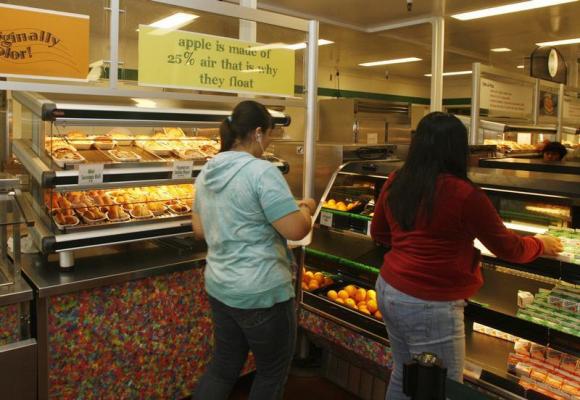 teenagers in the U.S. go to schools that have partnerships with food and drink companies, according to a new study.
teenagers in the U.S. go to schools that have partnerships with food and drink companies, according to a new study.Those partnerships include exclusive contracts for beverages sold in schools and food coupons given out as rewards.
"The companies that do the most of this kind of marketing manufacture products that children should not be consuming at all or in large quantities, like sugary drinks," said Jennifer Harris.
"Parents really don't understand the extent of food marketing that's going on in the schools. It's in effect happening behind parents' backs," Harris said.
Harris, from the Rudd Center for Food Policy and Obesity at Yale University in New Haven, Connecticut, co-wrote an editorial published with the new study.
"On the one hand schools are trying to teach children about good nutrition and healthy eating; on the other hand these companies are actually in the schools promoting their products directly to children," she told Reuters Health.
In exchange for selling or advertising their products in schools, corporations will often give school districts a certain percentage of their sales or donate much-needed supplies. Companies benefit by increasing brand recognition and brand loyalty among young customers.
For their study, researchers lead by Yvonne Terry-McElrath from the University of Michigan in Ann Arbor surveyed a nationally-representative group of administrators at public elementary, middle and high schools each year between 2007 and 2012.
They asked administrators about any profits or incentives their school received from food and beverage companies and if companies displayed ads or sponsored events.
The study included about 2,400 elementary schools, 800 middle schools and 800 high schools.
The most common form of food commercialism in elementary schools was awarding coupons as incentives, like for progress in reading. In 2012, 64 percent of all public elementary school students went to schools that gave away coupons for food and drink products.
Older students more often went to schools that had contracts with beverage companies to exclusively sell their products on campus. About half of middle school students and 70 percent of high school students went to schools with those contracts in 2012. Both of those figures had declined somewhat since 2007, however.
Beverage contracts were especially common at schools with more disadvantaged and white students, the researchers reported Monday in JAMA Pediatrics.
Overall, roughly 70 percent of elementary and middle school students and 90 percent of high school students were exposed to some type of food commercialism in school.
"We want to encourage healthy consumption and healthy nutrition patterns," Terry-McElrath said.
"I think at the very least, we need to have some good strong policies that say, hey, you really can't market stuff that's not healthful for the kids."
She said there has been some progress due to recent recommendations and voluntary agreements by companies to cut back on marketing to children.
New nutrition standards from the U.S. Department of Agriculture will also put more restrictions on what companies can sell in schools - but they don't address marketing.
Those standards "largely follow the voluntary guidelines implemented by our industry in 2010," a representative from the American Beverage Association, a trade group, wrote in a statement to Reuters Health.
"These guidelines . . . removed full-calorie soft drinks from schools and replaced them with more lower-calorie, smaller-portion beverage options. As a result of this initiative, independent, published studies showed that 90 percent fewer beverage calories were shipped to schools between 2004-2005 and 2009-10."
Parents who are concerned about marketing in schools can talk with their children, and with administrators, too, researchers said.
"Ask what the school's policy is," Terry-McElrath advised. If there's no policy about food and beverage marketing, she recommended discussing that with the school and looking at policies in other districts that could be used as a model.
"If parents talk to their kids and ask their kids to look out for this, this could be a great learning experience," Harris said.





